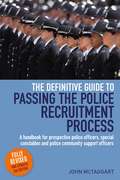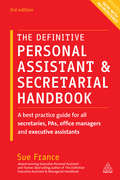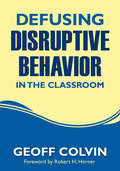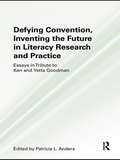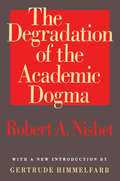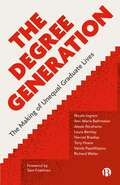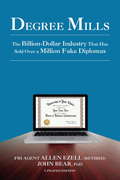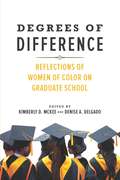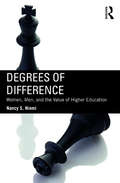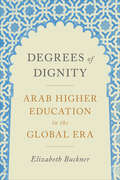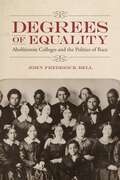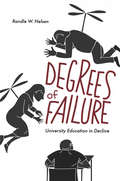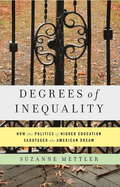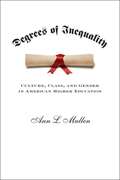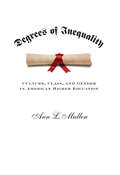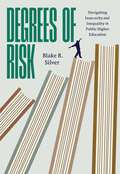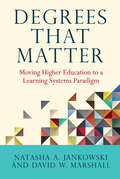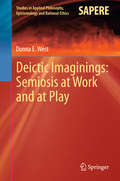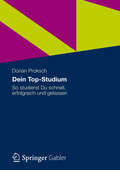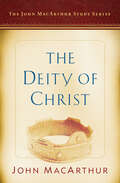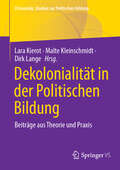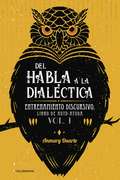- Table View
- List View
The Definitive Guide To Passing The Police Recruitment Process 2nd Edition: A handbook for prospective police officers, special constables and police community support officers
by John MctaggartEvery police force in England and Wales uses the same national application form and assessment centre. This book tells you not just about the process, but what you need to do to impress the assessors. Now in a revised new edition to reflect the recent changes in the six core skills by which all police applicants are assessed, it provides:
The Definitive Guide To Passing The Police Recruitment Process (2nd Edition): A handbook for prospective police officers, special constables and police community support officers
by John McTaggartThis book has been written with one very specific objective in mind. It aims to give you, the reader, an in-depth appreciation of the skills and abilities required to pass the police national recruitment tests, including the process for applying to be a Police Community Support Officer (PCSO). <P><P>As you read through this book, you will see the approach is to explain in detail the reasoning and rationale behind each exercise, the mechanics of how each exercise works, and the various limitations that exist within the exercise itself – from the perspective of those who designed it. It is not about making you a better person, although if you follow the principles contained throughout, you may just end up that way! <P> In essence, this book is a ‘how to’ guide to passing the police recruitment system. It aims to give you the best chance of passing through the process successfully.
The Definitive Personal Assistant & Secretarial Handbook
by Sue FranceWritten by a former Times Crème PA of the Year, this new edition of The Definitive Personal Assistant and Secretarial Handbook is the ultimate guide for all management assistants, PAs, secretaries and executive assistants. Administrative personnel in today's workplace hold an immense influence, not only on their bosses' performance, but also on the running of the whole organisation. This best-selling book is the only resource needed to excel in one's role as an assistant, outshine bosses' expectations and go up the ladder. Placing special emphasis on career development and learning, it provides help and advice on the skills necessary to progress in your career. Along with a chapter to share with your boss for a more fruitful working relationship, it includes help with time management, networking, relationship management, communication and confidence. Now with a new chapter on how to use neuroscience tools to coach yourself through your weaknesses and primed behavioural traits, it also contains even more practical help with minute taking, telephone and mobile communication etiquette and presentation skills. With free downloadable online resources to aid the day-to-day running of your office, this comprehensive and accessible guide will help you keep your finger on the pulse and maintain your professional image.
Defusing Disruptive Behavior in the Classroom
by Geoffrey T. ColvinThe ultimate guide to handling problem behavior "in the heat of the moment"! When disruptive behavior occurs, your first response can determine how quickly the situation is resolved. Colvin offers teachers seven key behavioral principles and a range of research-based approaches for immediately defusing disruptive situations, avoiding escalation, and correcting behaviors. This resource features: Strategies that target specific behaviors, including off-task behavior, rule violations, disrespect, agitation, noncompliance, and threats and intimidation Common classroom scenarios and solutions for K–12 general and special education teachers Checklists and action plans for applying the strategies while maintaining the flow of instruction
Defying Convention, Inventing the Future in Literary Research and Practice
by Patricia L. AndersKen and Yetta Goodman are renowned and revered worldwide for their pioneering, influential work in the field of reading/literacy education. In this volume major literacy scholars from around the world pay tribute to their work and offer glimpses of what the future of literacy research and practice might be. The book is structured around several themes related to research, practice, and theories of reading and literacy processes that characterize the Goodmans’ scholarship. Each chapter reveals how the author’s scholarship connects to one or both of the Goodmans’ work and projects that connection to the future – what are the implications for future research, theory, practice, and/or assessment? This milestone volume marking the hugely significant work of the Goodmans will be welcomed across the field of literacy education.
The Degradation of the Academic Dogma
by Egon FriedellThis is one of the most important books ever published about the American university. Robert Nisbet accuses universities of having betrayed themselves. Over the centuries they earned the respect of society by attempting to remain faithful to what he terms "the academic dogma," the pursuit of knowledge for its own sake. The measure of a university's greatness and of the stature of an individual scholar was determined not by the immediate usefulness of the work done, but by how much it contributed to scholarship, learning, and teaching.American universities abandoned this ideal, Nisbet charges, after World War II, welcoming onto their campuses academic entrepreneurs engaged in the "higher capitalism," the highly profitable sale of knowledge. This "reformation," says Nisbet, has resulted in the greatest change in the structure and values of the university that has occurred since their founding as guilds in the Middle Ages. And it may be responsible, for reasons he spells out in convincing detail, for their eventual demise as centers of learning.In her introduction, Gertrude Himmelfarb pays tribute to Robert Nisbet for his prescience in analyzing the reformation of the university in the postwar period. A second reformation, she says, has further undermined the academic dogma, first by applying the principles of affirmative action and multiculturalism to the curriculum as well as to student admissions and faculty hiring, and then by "deconstructing" the disciplines, thus subverting the ideas of truth, reason, and objectivity. The Degradation of the Academic Dogma is even more pertinent today than when it was first published a quarter of a century ago. For those concerned with the integrity of the university and of intellectual life, Robert Nisbet has once again proved himself a prophet and a mentor.
The Degree Generation: The Making of Unequal Graduate Lives
by Nicola Ingram Ann-Marie Bathmaker Jessie Abrahams Laura Bentley Harriet Bradley Tony Hoare Vanda Papafilippou Richard WallerWhat are the challenges for the current generation of graduate millennials? The role of universities and the changing nature of the graduate labour market are constantly in the news, but less is known about the experiences of those going through it. This book traces the transition to the graduate labour market of a cohort of middle-class and working-class young people who were tracked through seven years of their undergraduate and post-graduation lives. Using personal stories and voices, the book provides fascinating insights into the group’s experience of graduate employment and how their life-course transitions are shaped by their social backgrounds and education. Critically evaluating current government and university policies, it shows the attitudes and values of this generation towards their hopes and aspirations on employment, political attitudes and cultural practices.
Degree Mills
by Allen EzellWhen the first edition of Degree Mills was published, fake universities and counterfeit degrees were already a significant problem. Fueled by the Internet, this scam continues to grow--now more than half of all people claiming a new PhD in fact have a fake degree.In this updated edition, experts Allen Ezell and John Bear go beyond exposing these fraudulent practices to provide detailed recommendations--for government agencies, educational institutions, and individuals--on what can be done to rid us of them. This eye-opening and definitive guide shows how degree mills operate and how to check the validity of anyone's degree--an indispensable reference book.
Degrees of Difference: Reflections of Women of Color on Graduate School
by Kimberly D. McKee Denise A. Delgado Karen J. LeongUniversity commitments to diversity and inclusivity have yet to translate into support for women of color graduate students. Sexism, classism, homophobia, racial microaggressions, alienation, disillusionment, a lack of institutional and departmental support, limited help from family and partners, imposter syndrome, narrow reading lists—all remain commonplace. Indifference to the struggles of women of color in graduate school and widespread dismissal of their work further poisons an atmosphere that suffocates not only ambition but a person's quality of life. In Degrees of Difference, women of color from diverse backgrounds give frank, unapologetic accounts of their battles—both internal and external—to navigate grad school and fulfill their ambitions. At the same time, the authors offer strategies for surviving the grind via stories of their own hard-won successes with self-care, building supportive communities, finding like-minded mentors, and resisting racism and unsupportive faculty and colleagues. Contributors: Aeriel A. Ashlee, Denise A. Delgado, Nwadiogo I. Ejiogu, Delia Fernández, Regina Emily Idoate, Karen J. Leong, Kimberly D. McKee, Délice Mugabo, Carrie Sampson, Arianna Taboada, Jenny Heijun Wills, and Soha Youssef
Degrees of Difference: Women, Men, and the Value of Higher Education
by Nancy S. NiemiThis volume investigates the dissonance between the supposed advantage held by educated women and their continued lack of economic and political power. Niemi explains the developments of the so-called "female advantage" and "boy crisis" in American higher education, setting them alongside socioeconomic and racial developments in women’s and men’s lives throughout the last 40 years. Exploring the relationship between higher education credentials and their utility in creating political, economic, and social success, Degrees of Difference identifies ways in which gender and academic achievement contribute to women’s and men’s power to shape their lives. This important book brings new light to the issues of power, gender identities, and the role of American higher education in creating gender equity.
Degrees of Dignity: Arab Higher Education in the Global Era
by Elizabeth BucknerPresenting an analysis of higher education in eight countries in the Arab Middle East and North Africa, Degrees of Dignity works to dismantle narratives of crisis and assert approaches to institutional reform. Drawing on policy documents, media narratives, interviews, and personal experiences, Elizabeth Buckner explores how apolitical external reform models become contested and modified by local actors in ways that are simultaneously complicated, surprising, and even inspiring. Degrees of Dignity documents how the global discourses of neoliberalism have legitimized specific policy models for higher education reform in the Arab world, including quality assurance, privatization, and internationalization. Through a multi-level and comparative analysis, this book examines how policy models are implemented, with often complex results, in countries throughout the region. Ultimately, Degrees of Dignity calls on the field of higher education development to rethink current approaches to higher education reform: rather than viewing the Arab world as a site for intervention, it argues that the Arab world can act as a source for insight on resilient higher education systems.
Degrees of Equality: Abolitionist Colleges and the Politics of Race
by John Frederick BellThe abolitionist movement not only helped bring an end to slavery in the United States but also inspired the large-scale admission of African Americans to the country’s colleges and universities. Oberlin College changed the face of American higher education in 1835 when it began enrolling students irrespective of race and sex. Camaraderie among races flourished at the Ohio institution and at two other leading abolitionist colleges, Berea in Kentucky and New York Central, where Black and white students allied in the fight for emancipation and civil rights. After Reconstruction, however, color lines emerged on even the most progressive campuses. For new generations of white students and faculty, ideas of fairness toward African Americans rarely extended beyond tolerating their presence in the classroom, and overt acts of racial discrimination grew increasingly common by the 1880s.John Frederick Bell’s Degrees of Equality analyzes the trajectory of interracial reform at Oberlin, New York Central, and Berea, noting its implications for the progress of racial justice in both the nineteenth and twenty-first centuries. Drawing on student and alumni writings, institutional records, and promotional materials, Bell interrogates how abolitionists and their successors put their principles into practice. The ultimate failure of these social experiments illustrates a tragic irony of abolitionism, as the achievement of African American freedom and citizenship led whites to divest from the project of racial pluralism.
Degrees of Failure: University Education in Decline
by Randle W. NelsenIn Degrees of Failure, Randle Nelsen brings together such diverse topics as campus parking, college sports, helicopter parents, edu-business as edu-tainment, and technology in teaching to show how continuing inequities, grounded in large part upon social class differences, are maintained and reproduced in our universities. Paying special attention to the role played by professors in solidifying status quo arrangements, Nelsen makes the strange familiar for those outside the university bureaucracy and the familiar strange for those whose participation in university settings is a routine part of everyday life.
Degrees of Inequality: How the Politics of Higher Education Sabotaged the American Dream
by Suzanne MettlerOnce a sure path to the American Dream, college is now creating a caste system within American society
Degrees Of Inequality: Culture, Class, And Gender In American Higher Education
by Ann MullenDegrees of Inequality reveals the powerful patterns of social inequality in American higher education by analyzing how the social background of students shapes nearly every facet of the college experience. <p><p> Even as the most prestigious institutions claim to open their doors to students from diverse backgrounds, class disparities remain. Just two miles apart stand two institutions that represent the stark class contrast in American higher education. Yale, an elite Ivy League university, boasts accomplished alumni, including national and world leaders in business and politics. Southern Connecticut State University graduates mostly commuter students seeking credential degrees in fields with good job prospects. <p> Ann L. Mullen interviewed students from both universities and found that their college choices and experiences were strongly linked to social background and gender. Yale students, most having generations of family members with college degrees, are encouraged to approach their college years as an opportunity for intellectual and personal enrichment. Southern students, however, perceive a college degree as a path to a better career, and many work full- or part-time jobs to help fund their education. <p> Moving interviews with 100 students at the two institutions highlight how American higher education reinforces the same inequities it has been aiming to transcend.
Degrees of Inequality: Culture, Class, and Gender in American Higher Education
by Ann L. Mullen2011 Educator's Award. Delta Kappa Gamma Society International2011 Outstanding Publication in Postsecondary Education, American Educational Research Association, Division JDegrees of Inequality reveals the powerful patterns of social inequality in American higher education by analyzing how the social background of students shapes nearly every facet of the college experience. Even as the most prestigious institutions claim to open their doors to students from diverse backgrounds, class disparities remain. Just two miles apart stand two institutions that represent the stark class contrast in American higher education. Yale, an elite Ivy League university, boasts accomplished alumni, including national and world leaders in business and politics. Southern Connecticut State University graduates mostly commuter students seeking credential degrees in fields with good job prospects. Ann L. Mullen interviewed students from both universities and found that their college choices and experiences were strongly linked to social background and gender. Yale students, most having generations of family members with college degrees, are encouraged to approach their college years as an opportunity for intellectual and personal enrichment. Southern students, however, perceive a college degree as a path to a better career, and many work full- or part-time jobs to help fund their education.Moving interviews with 100 students at the two institutions highlight how American higher education reinforces the same inequities it has been aiming to transcend.
Degrees of Risk: Navigating Insecurity and Inequality in Public Higher Education
by Blake R. SilverAn ethnographic analysis of how insecurity is at the heart of contemporary higher education. Institutions of higher education are often described as “ivory towers,” places of privilege where students exist in a “campus bubble,” insulated from the trials of the outside world. These metaphors reveal a widespread belief that college provides young people with stability and keeps insecurity at bay. But for many students, that’s simply not the case. Degrees of Risk reveals how insecurity permeates every facet of college life for students at public universities. Sociologist Blake Silver dissects how these institutions play a direct role in perpetuating uncertainty, instability, individualism, and anxiety about the future. Silver examined interviews with more than one hundred students who described the risks that surrounded every decision: which major to choose, whether to take online classes, and how to find funding. He expertly identified the ways the college experience played out differently for students from different backgrounds. For students from financially secure families with knowledge of how college works, all the choices and flexibility of college felt like an adventure or a wealth of opportunities. But for many others, especially low-income, first-generation students, their personal and family circumstances meant that that flexibility felt like murkiness and precarity. In addition, he discovered that students managed insecurity in very different ways, intensifying inequality at the intersections of socioeconomic status, race, gender, and other sociodemographic dimensions. Drawing from these firsthand accounts, Degrees of Risk presents a model for a better university, one that fosters success and confidence for a diverse range of students.
Degrees That Matter: Moving Higher Education to a Learning Systems Paradigm
by Natasha A. Jankowski David W. MarshallSponsored by Concerned by ongoing debates about higher education that talk past one another, the authors of this book show how to move beyond these and other obstacles to improve the student learning experience and further successful college outcomes. Offering an alternative to the culture of compliance in assessment and accreditation, they propose a different approach which they call the Learning System Paradigm. Building on the shift in focus from teaching to learning, the new paradigm encourages faculty and staff to systematically seek out information on how well students are learning and how well various areas of the institution are supporting the student experience and to use that information to create more coherent and explicit learning experiences for students.The authors begin by surveying the crowded terrain of reform in higher education and proceed from there to explore the emergence of this alternative paradigm that brings all these efforts together in a coherent way. The Learning System Paradigm presented in chapter two includes four key elements—consensus, alignment, student-centeredness, and communication. Chapter three focuses upon developing an encompassing notion of alignment that enables faculty, staff, and administrators to reshape institutional practice in ways that promote synergistic, integrative learning. Chapters four and five turn to practice, exploring the application of the paradigm to the work of curriculum mapping and assignment design. Chapter six focuses upon barriers to the work and presents ways to start and options for moving around barriers, and the final chapter explores ongoing implications of the new paradigm, offering strategies for communicating the impact of alignment on student learning.The book draws upon two recent initiatives in the United States: the Tuning process, adapted from a European approach to breaking down siloes in the European Union educational space; and the Degree Qualifications Profile (DQP), a document that identifies and describes core areas of learning that are common to institutions in the US. Many of the examples are drawn from site visit reports, self-reported activities, workshops, and project experience collected by the National Institute for Learning Outcomes Assessment (NILOA) between 2010 and 2016. In that six-year window, NILOA witnessed the use of Tuning and/or the DQP in hundreds of institutions across the nation.
Deictic Imaginings: Semiosis at Work and at Play
by Donna E. WestThis work represents the first integrated account of how deixis operates to facilitate points of view, providing the raw material for reconciling index and object. The book offers a fresh, applied philosophical approach using original empirical evidence to show that deictic demonstratives hasten the recognition of core representational constructs. It presents a case where the comprehension of shifting points of view by means of deixis is paramount to a theory of mind and to a worldview that incorporates human components of discovering and extending spatial knowledge. The book supports Peirce's triadic sign theory as a more adequate explanatory account compared with those of Bühler and Piaget. Peirce's unitary approach underscores the artificiality of constructing a worldview driven by logical reasoning alone; it highlights the importance of self-regulation and the appreciation of otherness within a sociocultural milieu. Integral to this semiotic perspective is imagination as a primary tool for situating the self in constructed realities, thus infusing reality with new possibilities. Imagination is likewise necessary to establish postures of mind for the self and others. Within these imaginative scenarios (consisting of overt, and then covert self dialogue) children construct their own worldviews, through linguistic role-taking, as they legitimize conflicting viewpoints within imagined spatial frameworks.
Dein Top-Studium
by Dorian ProkschStudierende aller Fachrichtungen stehen heute unter hohem Leistungsdruck: Die Umstellung auf Bachelor und Master und der Wettbewerbsdruck auf dem Arbeitsmarkt erfordern neben mehr Prüfungen, Fremdsprachen und Berufspraktika auch einen Abschluss mit Bestnoten in der Regelstudienzeit. Dein Top-Studium zeigt, wie Studierende ihr Studium schnell und erfolgreich meistern und es auch schon auf die Zukunft danach ausrichten, wann sich ein Master-Studium lohnt, wie man parallel sogar ein Unternehmen gründen kann oder das Studentenleben einfach nur genießt und trotzdem gute Noten schreibt. Die alltagstauglichen Tipps und Anregungen helfen, die selbst gesetzten Ziele tatsächlich zu erreichen - mit vertretbarem Aufwand. Wer sich darauf einlässt, wird merken: Es ist viel leichter, als gedacht.
The Deity of Christ: A John MacArthur Study Series (John Macarthur Study Series 2017 Ser.)
by John F. MacArthur Jr.How is Jesus also God? Long ago, Jesus asked his disciples, &“Who do you say that I am?&” It's a question everyone must answer, and we need Scripture to tell us how. The Deity of Christ is a biblical defense of Jesus&’ divinity—the cornerstone of Christian doctrine. From over a dozen New Testament texts, pastor and theologian John MacArthur explores how Jesus is God, and why it matters. This study will deepen your knowledge of Christ, and thus your love for Him, fortifying your will and increasing your worship. No man in history is more perplexing or compelling than Jesus Christ—because no other man is also God. Let this book from bestselling author John MacArthur guide you deep into the profound truths of Christ.
The Deity of Christ: A John MacArthur Study Series (John Macarthur Study Series 2017 Ser.)
by John F. MacArthur Jr.How is Jesus also God? Long ago, Jesus asked his disciples, &“Who do you say that I am?&” It's a question everyone must answer, and we need Scripture to tell us how. The Deity of Christ is a biblical defense of Jesus&’ divinity—the cornerstone of Christian doctrine. From over a dozen New Testament texts, pastor and theologian John MacArthur explores how Jesus is God, and why it matters. This study will deepen your knowledge of Christ, and thus your love for Him, fortifying your will and increasing your worship. No man in history is more perplexing or compelling than Jesus Christ—because no other man is also God. Let this book from bestselling author John MacArthur guide you deep into the profound truths of Christ.
Dekolonialität in der Politischen Bildung: Beiträge aus Theorie und Praxis (Citizenship. Studien zur Politischen Bildung)
by Dirk Lange Malte Kleinschmidt Lara KierotIn diesem Sammelband werden aus unterschiedlichen fachspezifischen, wissenschaftlichen und praktischen Perspektiven vielfältige Aspekte des Themas „Dekolonialität in der Politischen Bildung“ beleuchtet und kritisch reflektiert. Die didaktischen Potenziale unterschiedlicher wissenschaftlicher Herangehensweisen und Praxiserfahrungen werden vorgestellt und theoretische Überlegungen sowie empirische Erkenntnisse zum Schwerpunktthema präsentiert.
Del
by Barbara W. MakarA systematic, phonics-based early reading program that includes: the most practice for every skill, decodable readers for every skill, and reinforcement materials--help struggling students succeed in the regular classroom
Del habla a la dialéctica: Entrenamiento Discursivo. Libro de Autoayuda. Vol. 1
by Anmary DuarteTrascender del mensaje simple a la brillantez de la discursividad. Inspirada en los niveles académicos del postgrado, nace un Hand Book desde las corrientes científicas de estudio de la Calidad, Competitividad y Excelencia como triada perfecta que conduce al éxito personal. <P><P>Esta obra las integra y las mezcla fructíferamente en el acervo cultural del individuo comprometido con su mejora intelectual y la continua búsqueda de conocimientos. Mensajes cargados de calidad dialéctica; son un sello de garantía de altas competencias demandadas en un mundo velozmente evolutivo, cada vez mas interconectado y abierto a la extrema exigencia informativa. <P>Lo que convierte a esta herramienta en una arma competitiva formidable para romper el molde y sobresalir entre millones de profesionales.
